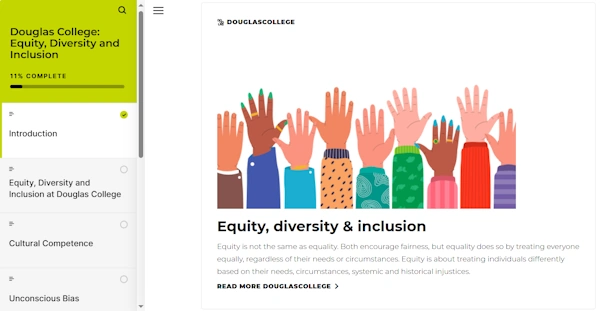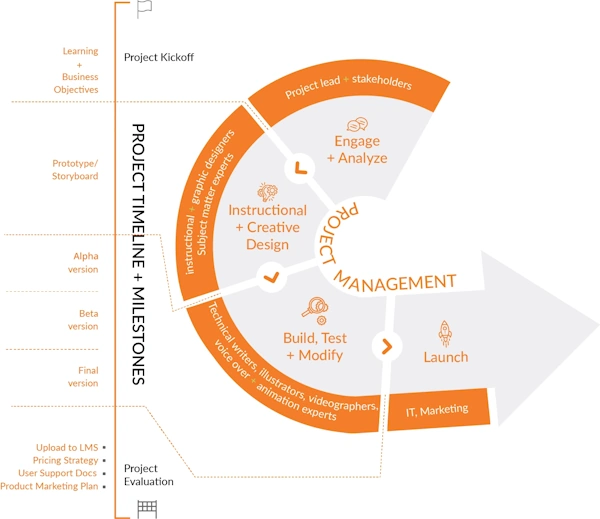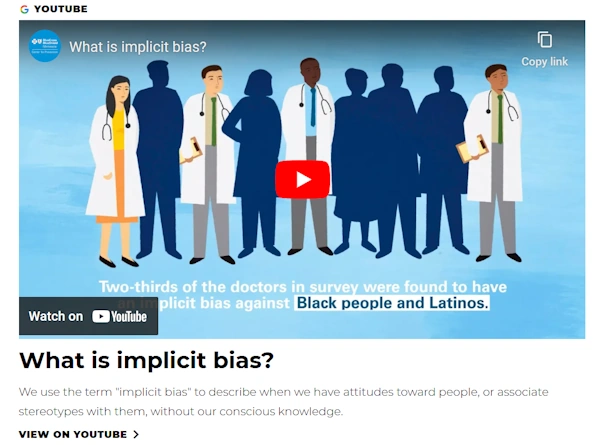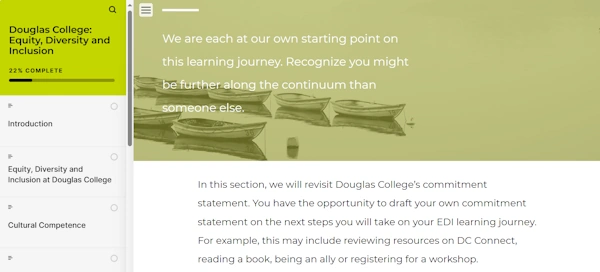In today’s rapidly changing workplace, fostering a culture of Equity, Diversity, and Inclusiveness (EDI) is more important than ever. Custom online EDI training is a powerful tool that equips organizations with the knowledge and skills to embrace these changes effectively. Unlike generic, off-the-shelf courses, custom EDI online training provides tailored content that aligns with an organization’s unique culture, values, and strategic goals, ensuring that training is relevant and impactful. This case study explores what is EDI training and the benefits of custom online EDI training. It provides insights into how Universities and Colleges, along with other Non-Profits, can implement transformative programs to create more inclusive, equitable, and diverse environments.
What Is EDI Training
Equity, Diversity, and Inclusiveness (EDI) training is a form of education designed to help individuals and organizations understand, recognize, and address issues related to equity, diversity, and inclusion within their environments. EDI online training aims to foster a more inclusive, respectful, and equitable workplace or community by increasing awareness and understanding of these concepts and promoting behaviors that support a diverse and inclusive environment.
Objectives of EDI Online Training
Typical objectives for many organizations for their online EDI training include
- Increase Awareness: Educate participants about the existence and impact of unconscious biases, stereotypes, and systemic discrimination
- Promote Empathy and Understanding: Encourage participants to understand and empathize with the experiences of others, particularly those from marginalized or underrepresented groups
- Develop Inclusive Behaviors: Equip individuals with practical tools and strategies to promote equity and inclusion in their daily interactions and decision-making processes
- Build a Supportive Culture: Create a workplace or community culture that actively supports diversity and inclusion, where everyone feels safe and valued
Typical Diversity Training Topics
Diversity training topics typically cover a range of themes. Common diversity training topics included are:
- Understanding Equity, Diversity, and Inclusion
- Unconscious Bias and Stereotypes
- Microaggressions and Their Impact
- Cultural Competency
- Inclusive Language and Communication
- Intersectionality
- Privilege and Power Dynamics
- Legal and Ethical Considerations
- Inclusive Leadership and Allyship
- Accessibility and Accommodation
- Responding to Discrimination and Harassment
- Building Inclusive Teams
- Measuring and Evaluating Inclusion Efforts
Benefits of EDI Training
There are many potential benefits of EDI online training, including
- Enhanced Organizational Culture: Promotes a positive and inclusive work environment where all employees feel valued and respected
- Improved Employee Recruitment, Engagement, and Retention: It can lead to a broader talent pool and reduced turnover as employees feel more valued and included
- Increased Innovation and Creativity: Diverse teams bring varied perspectives, which can lead to more innovative and creative problem-solving
- Reduced Workplace Conflicts: Greater understanding and respect for diversity can help minimize conflicts and misunderstandings
- Better Decision Making: Many organizations realize that EDI online training is essential because it offers various solutions and viewpoints. Research has shown that diverse groups make decisions faster and with better outcomes
“74% of millennial employees believe their organization is more innovative with a culture of inclusion, and 47% actively look for diversity and inclusion when sizing up potential employers.”
EDI Training Report from Deloitte
For more information about the benefits of EDI online training, diversity training topics, and why it’s vital in the workplace, read our blog post 14 Top Tips To Create Genuine Diversity In The Workplace Training Online.
Benefits Of Custom Training
When organizations decide to have online EDI training, they have a critical choice. Will they use generic, pre-existing training courses, or will they have a custom online EDI training course developed?
Generic or off-the-shelf online courses can be a good choice for some skill-specific training, such as training in a commonly used software platform or general time management skills. However, they are a poor choice for more nuanced, complex, and situational-specific training, such as online EDI training. Generic courses do not address specific organizational needs, lack engagement, and often require supplementary materials to fill in gaps, potentially leading to lower effectiveness and satisfaction among learners.
Custom-built online equity, diversity, and inclusion courses offer many benefits, including:
- Better ROI over the long term
- Tailored content to address an organization’s unique challenges, goals, and learning objectives
- Custom online EDI training reflects the organization’s culture, values, and branding, which helps to foster a sense of belonging and alignment among learners
- Unlike generic courses, you can easily update custom-built courses to adapt to changes in the organization’s needs, industry standards, or regulations
- Custom courses are often more interactive and engaging. They can be designed in various formats (e.g., videos, interactive simulations, quizzes, and infographics) to suit different learning preferences and contexts.
- Personalized content and interactive elements are proven to improve knowledge retention compared to generic, text-heavy courses
- Custom-built EDI online training is designed with specific learning outcomes in mind, focusing on the precise skills and knowledge that learners need to succeed in their roles
- Custom courses help learners apply what they learn more effectively by focusing on practical applications relevant to the organization
- Custom courses are aligned with an organization’s strategic goals, ensuring that training supports organizational objectives
- Custom online EDI training helps maintain consistent training standards across different organizational departments and locations
- We can scale custom courses to accommodate different group sizes, from small teams to the entire organization
Douglas College Online EDI Training Development
Douglas College engaged Spark + Co. to create several online courses for all faculty, staff, and students. One of these courses was on Equity, Diversity, and Inclusion.
The EDI Training Problem
Douglas College is an educational institution committed to fostering an equitable, accessible, diverse, and inclusive campus where everyone feels a sense of belonging. An initial step along this journey was to develop online EDI training for faculty, staff, and administrators. The challenge was to build internal capacity in equity, diversity, and inclusion with all employees required to complete the training in their first six months of employment. We aligned the online EDI training with the college values of diversity and inclusion, honesty and integrity, and objectives in the Douglas College Strategic Plan.
Project Constraints
All projects have constraints related to resources (people or money), technology, or strict program requirements. We identified three constraints for this online EDI training project.
- Limited budget – The college identified a strict budget for the project. That’s quite typical, and we regularly work with clients to meet their budgets while delivering transformative eLearning. By balancing instructional activities, multi-media components, and other elements of the project, we identified options for the College project team to make educated decisions about the best way to complete the project successfully within the budget
- Community access – The course must be available to all faculty and staff. It couldn’t lock people out by being behind their LMS firewall. We provided several novel technical solutions to make the online EDI training available to all faculty and staff
- Limited availability – The staff advisory committee on the project had limited availability due to other priorities. During the kick-off meeting, we identified roles, timelines, and critical decision points. Staff committee feedback was provided at essential points without being burdened with ongoing project duties
EDI Online Training Design Process
To develop EDI online training and other eLearning, we have a 4-stage proprietary process (below).
Engage + Analyze
During this stage of the project, we worked with stakeholders from the college to
- Determine the learning objectives for the EDI training course
- Review and analyze all the content
- Determine relevant content and multi-media assets to use
- Complete an evaluation of the faculty, staff, and administrator audiences, determining commonalities and differences, as these courses had to appeal to a broad audience
- Create various conceptual approaches to the design and choose a preferred design concept
- Confirmed the scope of the final solution recommended
Instructional + Creative Design
During this stage we worked with the college to outline and storyboard the most impactful aspects of the course and mapped out the required instructional activities. For EDI courses, we could explain many concepts during the training. However, the approach for this online EDI training course was to focus on the main concepts first. Then, we created opportunities for the learner to explore and practice these concepts using real-world examples. It allowed realistic reflection on highly relevant concepts.
The project team made decisions about
- Scripts
- Voice-over narration
- Animation
- Topics and course flow
- Instructional activities to ensure all the learning objectives were covered
Build, Test + Modify Equity, Diversity + Inclusiveness Training
In this stage, we worked iteratively and collaboratively with the College project team to
- Create the visual theme
- Prepare the script
- Develop graphics, animations, videos, voice-overs, and other multi-media
- Build 3 online EDI training versions incorporating feedback on each version
- Completed an internal review
- Developed Q+A and a design document for the College staff to understand how to make future changes or use templates for additional course
- Created the final course product
Launch of the EDI Online Training
In the launch phase for the equity, diversity, and inclusion training course, we
- Tested the course on the hosting platform
- Prepared and finalized a communications and marketing plan
- Embedded an end-of-course survey to receive feedback on the course experience
- Created a downloadable badge to prove course completion
EDI Training Course Solution
We created the EDI training course in Articulate Rise, with interactive activities developed in Articulate Storyline embedded into the course.
Outcome Of The Equity, Diversity And Inclusion Training
The college launched the EDI online training on time and within budget, making it available to the college community of faculty and staff to complete at their own pace. The program successfully embedded equity, diversity, and inclusion into their institutional culture, structures, policies, and practices.
“We stand in support for all those who have and continue to face discrimination due to sex, race, colour, ancestry, place of origin, political belief, religion, marital status, family status, age, physical or mental disability, sexual orientation, gender identity and expression, or a criminal conviction. We commit to dismantling the systems that oppress and hold up discrimination.”
Support for the online EDI training with a statement on justice, equity, diversity, and inclusion from the Douglas College Student Union.








